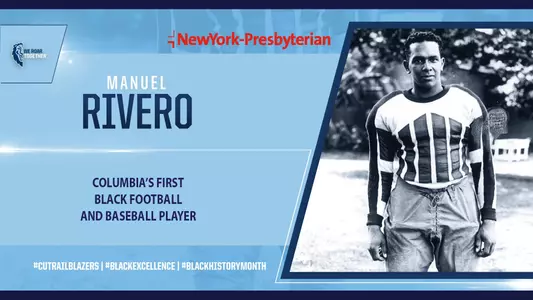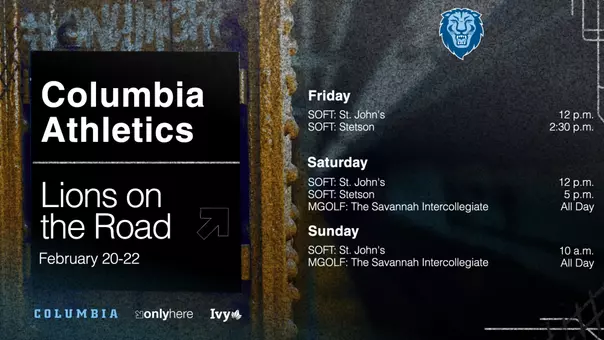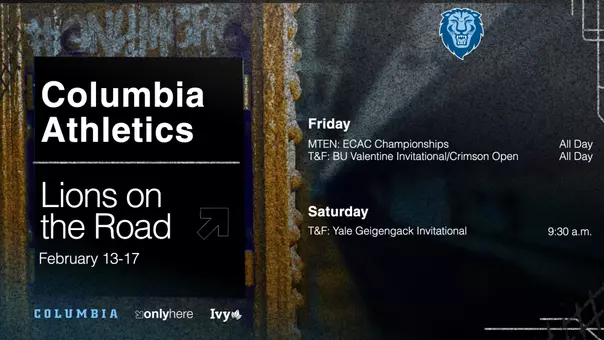
Columbia Trailblazer: Manuel Rivero '33ENG, '38HR
2/9/2021 11:00:00 AM | Baseball, Football, General
Black History Month Feature PageManuel Rivero Golden FlashManuel Rivero Lincoln HOFManuel Rivero Hall at Lincoln
Nicknamed the “Golden Flash,” two-sport athlete Manuel Rivero is Columbia’s first Black football and baseball player.
BLACK HISTORY MONTH—A two-sport athlete in football and baseball at Columbia, Manuel Rivero became the first-ever Black student-athlete to play both football and baseball for the Lions from 1930-33.
Nicknamed the "Golden Flash," Rivero, who was born in Havana, Cuba, lettered for three years (1930-32) under Head Coach Lou Little. Rivero made a huge splash in Morningside Heights on three acclaimed football teams as a starting halfback on a team that played before enormous crowds as well. He even played quarterback when starter Ralph Hewitt was out with an injury. On Dec. 9, 1931, in an exhibition game against Princeton, Rivero's speed was on display as he took the opening kickoff and raced 86 yards down the sideline for a touchdown.
At the time, many college football coaches observed what they called the "gentleman's agreement," which meant if one team had a black player and the other didn't, then the "gentleman" coach wouldn't play his black player that game. On a train ride to a game earlier in his career, Rivero's Columbia teammates found out about it and told Little that they wouldn't play either. Because of that game and others like it where teammates, allies, stood up against racism that black players were allowed to play college football.
 Before Rivero, several other Black players participated on Columbia's football team, but Rivero was the first to play regularly and earn a varsity letter.
Before Rivero, several other Black players participated on Columbia's football team, but Rivero was the first to play regularly and earn a varsity letter.
Also a versatile baseball player, Rivero played on the Columbia squad for three seasons from 1931-33. Rivero played third base, centerfield and pitched for the Lions during his career. He had a storybook finish to his Lion baseball career, going two-for-four in an 8-3 win over Fordham in May 1933 as nearly 5,000 fans gave the centerfielder a standing ovation in appreciation. Rivero extended his baseball career as he played briefly in the Negro Baseball Leagues and also saw action for the Cuban All-Stars in 1933.
Picked as his senior class's second-best athlete in spring 1933, Rivero earned two degrees from Columbia, a bachelor's degree in engineering in 1933 and a Master's degree in Health and Recreation in 1938.
Following his days at Columbia, Rivero had a long and distinguished 55-year career as a coach, administrator, and professor at Lincoln University, a historically black school in Pennsylvania. He went on to found the Department of Health, Recreation and Physical Education at Lincoln. Rivero, who served as the school's baseball coach for 39 years, also coached all of Lincoln's teams—football, track and field, tennis and basketball.
At Lincoln, he received numerous honors during his lifetime. In 1960, he was named the Chapel of the Four Chaplains Award and named Teacher of the Year. In 1978, he received the Lincoln University Alumni Association Award, the National Association of Collegiate Directors of Athletics Award and the Hall of Fame Award. In 1980, Lincoln University named Rivero Emeritus Professor of Physical Education.
He also did good deeds. When Cornell's Brud Holland, a football All-American, was shamefully shut out from playing in the National Football League in 1938 because of a silent 14-year ban on Black players, Rivero hired him as coach at Lincoln. Holland would eventually become a university president and the United States ambassador to Sweden.
Rivero retired from Lincoln in 1977 as the department chair and athletic director in 1977. Five years later he was inducted into the National Association of Collegiate Directors of Athletics Hall of Fame. In 1986, Lincoln dedicated its basketball arena in his honor as the school renamed its gym Manuel Rivero Hall.
Rivero also gave back to his community by serving on the Pennsylvania State Traffic Control Committee, serving as chairman of the Oxford Pennsylvania United Way, and as a member of the Board of Supervisors for Lower Oxford Township.
Through the years, Rivero continued to maintain his connection to Columbia. He starred on the Lion Alumni football team with Sid Luckman in 1941 as they defeated the Lions varsity 14-13. Rivero was also one of three original players for Little to attend the Hall of Fame coach's 25th anniversary dinner.
An All-New York City football and baseball star, Rivero passed away on August 18, 2001 in Rising Sun, Md., at 92-years of age.
Nicknamed the "Golden Flash," Rivero, who was born in Havana, Cuba, lettered for three years (1930-32) under Head Coach Lou Little. Rivero made a huge splash in Morningside Heights on three acclaimed football teams as a starting halfback on a team that played before enormous crowds as well. He even played quarterback when starter Ralph Hewitt was out with an injury. On Dec. 9, 1931, in an exhibition game against Princeton, Rivero's speed was on display as he took the opening kickoff and raced 86 yards down the sideline for a touchdown.
At the time, many college football coaches observed what they called the "gentleman's agreement," which meant if one team had a black player and the other didn't, then the "gentleman" coach wouldn't play his black player that game. On a train ride to a game earlier in his career, Rivero's Columbia teammates found out about it and told Little that they wouldn't play either. Because of that game and others like it where teammates, allies, stood up against racism that black players were allowed to play college football.
 Before Rivero, several other Black players participated on Columbia's football team, but Rivero was the first to play regularly and earn a varsity letter.
Before Rivero, several other Black players participated on Columbia's football team, but Rivero was the first to play regularly and earn a varsity letter.Also a versatile baseball player, Rivero played on the Columbia squad for three seasons from 1931-33. Rivero played third base, centerfield and pitched for the Lions during his career. He had a storybook finish to his Lion baseball career, going two-for-four in an 8-3 win over Fordham in May 1933 as nearly 5,000 fans gave the centerfielder a standing ovation in appreciation. Rivero extended his baseball career as he played briefly in the Negro Baseball Leagues and also saw action for the Cuban All-Stars in 1933.
Picked as his senior class's second-best athlete in spring 1933, Rivero earned two degrees from Columbia, a bachelor's degree in engineering in 1933 and a Master's degree in Health and Recreation in 1938.
Following his days at Columbia, Rivero had a long and distinguished 55-year career as a coach, administrator, and professor at Lincoln University, a historically black school in Pennsylvania. He went on to found the Department of Health, Recreation and Physical Education at Lincoln. Rivero, who served as the school's baseball coach for 39 years, also coached all of Lincoln's teams—football, track and field, tennis and basketball.
At Lincoln, he received numerous honors during his lifetime. In 1960, he was named the Chapel of the Four Chaplains Award and named Teacher of the Year. In 1978, he received the Lincoln University Alumni Association Award, the National Association of Collegiate Directors of Athletics Award and the Hall of Fame Award. In 1980, Lincoln University named Rivero Emeritus Professor of Physical Education.
He also did good deeds. When Cornell's Brud Holland, a football All-American, was shamefully shut out from playing in the National Football League in 1938 because of a silent 14-year ban on Black players, Rivero hired him as coach at Lincoln. Holland would eventually become a university president and the United States ambassador to Sweden.
Rivero retired from Lincoln in 1977 as the department chair and athletic director in 1977. Five years later he was inducted into the National Association of Collegiate Directors of Athletics Hall of Fame. In 1986, Lincoln dedicated its basketball arena in his honor as the school renamed its gym Manuel Rivero Hall.
Rivero also gave back to his community by serving on the Pennsylvania State Traffic Control Committee, serving as chairman of the Oxford Pennsylvania United Way, and as a member of the Board of Supervisors for Lower Oxford Township.
Through the years, Rivero continued to maintain his connection to Columbia. He starred on the Lion Alumni football team with Sid Luckman in 1941 as they defeated the Lions varsity 14-13. Rivero was also one of three original players for Little to attend the Hall of Fame coach's 25th anniversary dinner.
An All-New York City football and baseball star, Rivero passed away on August 18, 2001 in Rising Sun, Md., at 92-years of age.
Feature: National Girls & Women in Sports Day Panel
Wednesday, February 04
Lions Rewind: Sept. 26 - Oct. 24, 2025
Wednesday, November 05
ROARfest
Friday, October 10
Lions Rewind: Sept. 1-25, 2025
Wednesday, October 01











